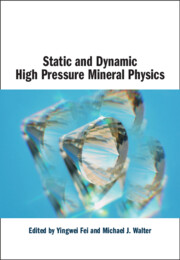Book contents
- Static and Dynamic High Pressure Mineral Physics
- Static and Dynamic High Pressure Mineral Physics
- Copyright page
- Contents
- Contributors
- 1 Introduction to Static and Dynamic High-Pressure Mineral Physics
- 2 Development of Static High-Pressure Techniques and the Study of the Earth’s Deep Interior in the Last 50 Years and Its Future
- 3 Applications of Synchrotron and FEL X-Rays in High-Pressure Research
- 4 Development of Large-Volume Diamond Anvil Cell for Neutron Diffraction: The Neutron Diamond Anvil Cell Project at ORNL
- 5 Light-Source Diffraction Studies of Planetary Materials under Dynamic Loading
- 6 New Analysis of Shock-Compression Data for Selected Silicates
- 7 Scaling Relations for Combined Static and Dynamic High-Pressure Experiments
- 8 Equations of State of Selected Solids for High-Pressure Research and Planetary Interior Density Models
- 9 Elasticity at High Pressure with Implication for the Earth’s Inner Core
- 10 Multigrain Crystallography at Megabar Pressures
- 11 Deformation and Plasticity of Materials under Extreme Conditions
- 12 Synthesis of High-Pressure Silicate Polymorphs Using Multi-Anvil Press
- 13 Investigation of Chemical Interaction and Melting Using Laser-Heated Diamond Anvil Cell
- 14 Molecular Compounds under Extreme Conditions
- 15 Superconductivity at High Pressure
- 16 Thermochemistry of High-Pressure Phases
- Index
12 - Synthesis of High-Pressure Silicate Polymorphs Using Multi-Anvil Press
Published online by Cambridge University Press: 03 August 2023
- Static and Dynamic High Pressure Mineral Physics
- Static and Dynamic High Pressure Mineral Physics
- Copyright page
- Contents
- Contributors
- 1 Introduction to Static and Dynamic High-Pressure Mineral Physics
- 2 Development of Static High-Pressure Techniques and the Study of the Earth’s Deep Interior in the Last 50 Years and Its Future
- 3 Applications of Synchrotron and FEL X-Rays in High-Pressure Research
- 4 Development of Large-Volume Diamond Anvil Cell for Neutron Diffraction: The Neutron Diamond Anvil Cell Project at ORNL
- 5 Light-Source Diffraction Studies of Planetary Materials under Dynamic Loading
- 6 New Analysis of Shock-Compression Data for Selected Silicates
- 7 Scaling Relations for Combined Static and Dynamic High-Pressure Experiments
- 8 Equations of State of Selected Solids for High-Pressure Research and Planetary Interior Density Models
- 9 Elasticity at High Pressure with Implication for the Earth’s Inner Core
- 10 Multigrain Crystallography at Megabar Pressures
- 11 Deformation and Plasticity of Materials under Extreme Conditions
- 12 Synthesis of High-Pressure Silicate Polymorphs Using Multi-Anvil Press
- 13 Investigation of Chemical Interaction and Melting Using Laser-Heated Diamond Anvil Cell
- 14 Molecular Compounds under Extreme Conditions
- 15 Superconductivity at High Pressure
- 16 Thermochemistry of High-Pressure Phases
- Index
Summary
Multi-anvil press (MAP) is a major type of apparatus for phase equilibrium, material synthesis, and property investigations at up to 120 GPa of static compression. Here I summarize the fundamental aspects of the MAP techniques, highlighting uncertainties in pressure and temperature in experiments using tungsten carbide (WC) anvils with 3 mm and 5 mm truncation edge lengths (TEL). To illustrate the application of the MAP for synthesizing millimeter-sized single crystals of deep mantle silicates, I review the theory of crystal growth and compile relevant phase diagrams. The theory informs synthesis methods such as slow cooling of a fluid solution and growing crystals in a thermal gradient. The updated phase diagrams involve Mg2SiO4, MgSiO3, and H2O at pressures up to 27 GPa and touch upon iron-bearing compositions. Also reviewed briefly are techniques to characterize the compositions and structures of synthesis products.
- Type
- Chapter
- Information
- Static and Dynamic High Pressure Mineral Physics , pp. 266 - 299Publisher: Cambridge University PressPrint publication year: 2022



